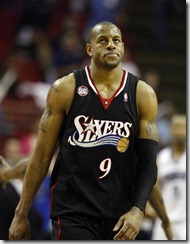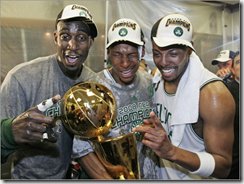With the NBA season in full swing the San Antonio Spurs are once again looking like a contender. However, there is one glaring difference between past Spurs championship teams and the squad the Spurs are suiting up this season: The presence of defensive rock and cluth-shot specialist, Bruce Bowen. Bruce harassed, terrorized, intimidated, and straight shut down the NBA's best scorers for the better part of the past decade en route to helping the Spurs to three titles during his tenure in San Antonio, while also fitting a 500 game starting streak in there somewhere. Bruce retired from the League last summer after being shipped to the Milwaukee Bucks and is fresh off enjoying his first full season away from the arena.
Unlike with a lot of other players, my decision to retire wasn’t a spur of the moment thing, so it’s not some kind of sudden shock. It was actually something that I’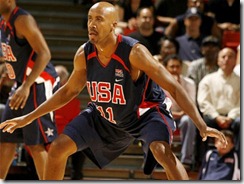 ve been planning for four or five years. Part of it was being away from my family, which would have been the case for me to play another year [referring to the fact that he was traded to Milwaukee and would no longer be living and playing in San Antonio]. I’m the father of two young boys, so that meant there was going to be separation. Its different when you travel and you come back home, whereas if I’m on another team completely, I just didn’t want to deal with the process of being away from my kids and my family, so as I said, I had prepared for this, and I thought that it was the right time.
ve been planning for four or five years. Part of it was being away from my family, which would have been the case for me to play another year [referring to the fact that he was traded to Milwaukee and would no longer be living and playing in San Antonio]. I’m the father of two young boys, so that meant there was going to be separation. Its different when you travel and you come back home, whereas if I’m on another team completely, I just didn’t want to deal with the process of being away from my kids and my family, so as I said, I had prepared for this, and I thought that it was the right time.
It is definitely different, but I’m so busy now and have other areas of my life that I get to focus on, like spending time with my family, so, so far I view retirement as a good thing. But, there are aspects of the game that I will miss, mainly the camaraderie you develop with your teammates; playing with the same guys for years, you know. During the season you spend more time with your teammates than with your actual family, so they kind of turn into a family. Trust me, I don’t miss training camp and I don’t miss practice. It’s funny because I’ve had a routine for so long, like during the day taking a nap and having your pregame meal. Now it’s just a bi-product of okay, let’s see, it’s four o’clock, what am I going to do right now? It’s interesting how you don’t necessarily understand how the real world operates because you’re so conditioned to a particular system.
I have been fortunate enough to be a part of three championship teams, and those of course rank high amongst my fondest memories of my time in the League, along with getting a chance to play with some of the players I’ve played with. You know, David Robinson was inducted into the Hall of Fame last year; that is something that I could not have dreamt of, and I’m so happy to have had the opportunity to play with someone of the character of David. Then you talk about San Antonio, we spent the most time with each other in the process of winning those championships as well, and those are some more fond memories there; being amongst those guys. It’s the relationships that you create in the League that are lasting, you know, you may come and go to different teams and things like that, but what it’s really about is the camaraderie and the relationships you might build along the way.
When I first came into the League, playing defense was the only way I could get onto the court, so my dedication to defense was a bi-product of me wanting to be on the floor. I felt like, you know, call me crazy if you’d like, if I’m actually on the floor then I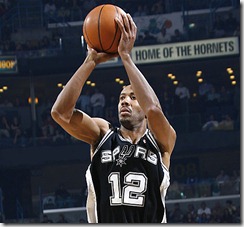 might have the opportunity to make big shots, and I think that’s what players would like to do to be a part of a championship-caliber team, have the opportunity to make big shots, and put your stamp on the game. So I guess part of this dedication to defense came from me just being a kid loving the game of basketball and understanding that sometimes you need to do whatever you can in order to get out onto the floor. I maximized the most out of my talent. Everybody is blessed with different talents and sometimes guys tend to want to do all of these other things when it is not their destiny. I appreciated the game. I understood that it was not my right to play, but it was an honor to play the game of basketball. Here it is, you got people fighting over in other countries just to protect our freedom and I get to play the game of basketball. Being that I get that opportunity, I’m trying to make the most out of it, which allowed me not to take the game for granted. This attitude fueled my dedication to defense as well as the [500] straight game streak.
might have the opportunity to make big shots, and I think that’s what players would like to do to be a part of a championship-caliber team, have the opportunity to make big shots, and put your stamp on the game. So I guess part of this dedication to defense came from me just being a kid loving the game of basketball and understanding that sometimes you need to do whatever you can in order to get out onto the floor. I maximized the most out of my talent. Everybody is blessed with different talents and sometimes guys tend to want to do all of these other things when it is not their destiny. I appreciated the game. I understood that it was not my right to play, but it was an honor to play the game of basketball. Here it is, you got people fighting over in other countries just to protect our freedom and I get to play the game of basketball. Being that I get that opportunity, I’m trying to make the most out of it, which allowed me not to take the game for granted. This attitude fueled my dedication to defense as well as the [500] straight game streak.
I think part of people’s interpretation of my play as dirty is that I was an aggressive player, and how could you not be in the game, especially going up against some of the guys that I would go up against night in and night out. So I’ve grown thick skin for that stuff quickly because I understand it’s something that they have to do, as far as people telling a story, and nothing I could do would change people’s opinions if that’s what they already thought. One year they were talking about how I couldn’t shoot and then I came out and lead the League in three point field goal percentage. But nothing was ever said about that because people already had their thought processes about what I was as a player. So after a while that stuff doesn’t bother me because I understood if they’re sitting up there whining and complaining about me, then I must be doing something right in this game. A few coaches have said, yeah Bruce is dirty if you’re playing against him, but he’s a player that you’d love to have and that’s all that matters to me. See, you never heard Michael Jordan call someone dirty, even though the Pistons during that time were hard fouling him, he never called them dirty. The true competitors of the game, they just compete; they don’t say anything about anybody else, they just compete, and that’s what it’s all about. So it’s all about whose saying these things; you take it with a grain of salt and keep moving.
Speaking of Michael Jordan, he was, of course, the hardest player I ever had to guard. But other than him I think Michael Redd was probably the toughest because he was left-handed and I only saw him twice a year, so he created more problems for me because of his ability to get off his shot quickly. Also he was awkward as far as where his release point was for his shot. You know, a lot of people might think Kobe would be the toughest, but that wasn’t the case. I basically knew what Kobe was going to do night in and night out, as far as the individual, but I didn’t see Michael Redd as often as I did Kobe, so there were more surprises with Michael Redd than there was with Kobe.
Outside of the NBA I spent a little time playing ball in France, and at this point I don’t really like the decision from guys that decide they want to skip college and go overseas. My thought process is what happens if you have a career-ending knee injury, can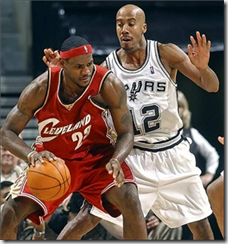 you go back to school then? At least going to college you will start the process of learning how to take care of yourself and get an education. There’s so many things that you learn in the aspects of just going out and being able to pay your bills in college. You hear so many bad situations about players today that end up spending all their money the wrong way and it makes you wonder, what kind of guidance did that individual have? And a lot of them don’t have any guidance, but they want to stop right there and use that as an excuse. In my opinion you can’t use that as an excuse because there are times that you learn things with smaller amounts of money, like college. You know in college is all you have left is $200 after paying all your bills, you better get out and get some groceries; you can’t afford those twenty dollar dinners every night or you are going to come up short. I just think there are so many life lessons in college in learning how to be responsible and I wish guys wouldn’t skip that process of life because they’re speeding through trying to accomplish the goal of playing in the NBA. I believe if it’s meant for you it will be there in the right time, but I can’t make that decision for them.
you go back to school then? At least going to college you will start the process of learning how to take care of yourself and get an education. There’s so many things that you learn in the aspects of just going out and being able to pay your bills in college. You hear so many bad situations about players today that end up spending all their money the wrong way and it makes you wonder, what kind of guidance did that individual have? And a lot of them don’t have any guidance, but they want to stop right there and use that as an excuse. In my opinion you can’t use that as an excuse because there are times that you learn things with smaller amounts of money, like college. You know in college is all you have left is $200 after paying all your bills, you better get out and get some groceries; you can’t afford those twenty dollar dinners every night or you are going to come up short. I just think there are so many life lessons in college in learning how to be responsible and I wish guys wouldn’t skip that process of life because they’re speeding through trying to accomplish the goal of playing in the NBA. I believe if it’s meant for you it will be there in the right time, but I can’t make that decision for them.
At this point, I’ve been happy to move on. I have three championship rings and I keep them in my closet. I don’t need to wear them. As some folks have said, in time history will show what you have done, and that is so much of the truth. So I think more than anything else, my legacy, if there is one, should just be that I’m one who maximized the most out of his potential, and when he was on the floor he gave it a hundred and ten percent.
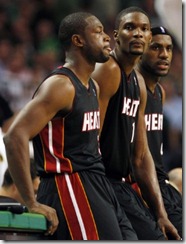 her and expect immediate results, but not many expected them to get off to this slow of a start. Back-to-back losses to Memphis and Indiana are something you would expect out of the struggling Sixers, not the already-anointed mighty Miami.
her and expect immediate results, but not many expected them to get off to this slow of a start. Back-to-back losses to Memphis and Indiana are something you would expect out of the struggling Sixers, not the already-anointed mighty Miami. 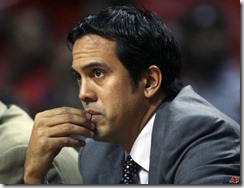 ther superstars was so promising that success was assumed. Whatever the case, success is certainly not promised, and LeBron and the Heat are learning that the hard way, and early altercations between Coach Spoelstra and his core superstars are not promising signs for the future of the season. The pressure pushing against this team looks like it has already begun to take a toll, with growing speculation about the security of Coach Spoelstra’s position, and an obvious lack of leadership, LeBron finds himself surrounded by a crowd that, outside of Wade, is largely comparable, and in some spots even inferior, to the Cavalier cast he jettisoned last summer for seemingly sunnier pastures.
ther superstars was so promising that success was assumed. Whatever the case, success is certainly not promised, and LeBron and the Heat are learning that the hard way, and early altercations between Coach Spoelstra and his core superstars are not promising signs for the future of the season. The pressure pushing against this team looks like it has already begun to take a toll, with growing speculation about the security of Coach Spoelstra’s position, and an obvious lack of leadership, LeBron finds himself surrounded by a crowd that, outside of Wade, is largely comparable, and in some spots even inferior, to the Cavalier cast he jettisoned last summer for seemingly sunnier pastures. 
